So, both in the course of preparing for my weekly blog entries, and just because I enjoy re-visiting the Fantastic Worlds of my childhood, I’ve devoured a lot of SF TV, lit and movies recently which date from the first third of my life. I’m reminded, in comparison to the fantastic fiction of other time periods, that, in the late Sixties and early Seventies, this was a genre badly in need of a daily dose of Prozac! I mean it wasn’t all dark and dreary, but, really, my first fifteen years were overlorded by some depressing s__t!
Herein a few examples. I tried to go chronologically. Feel free to add your own examples or counter-offerings! Oh, and, yeah, SPOILER ALERTS. I reveal lots of endings.
Star Trek – “City on the Edge of Forever” (1967)
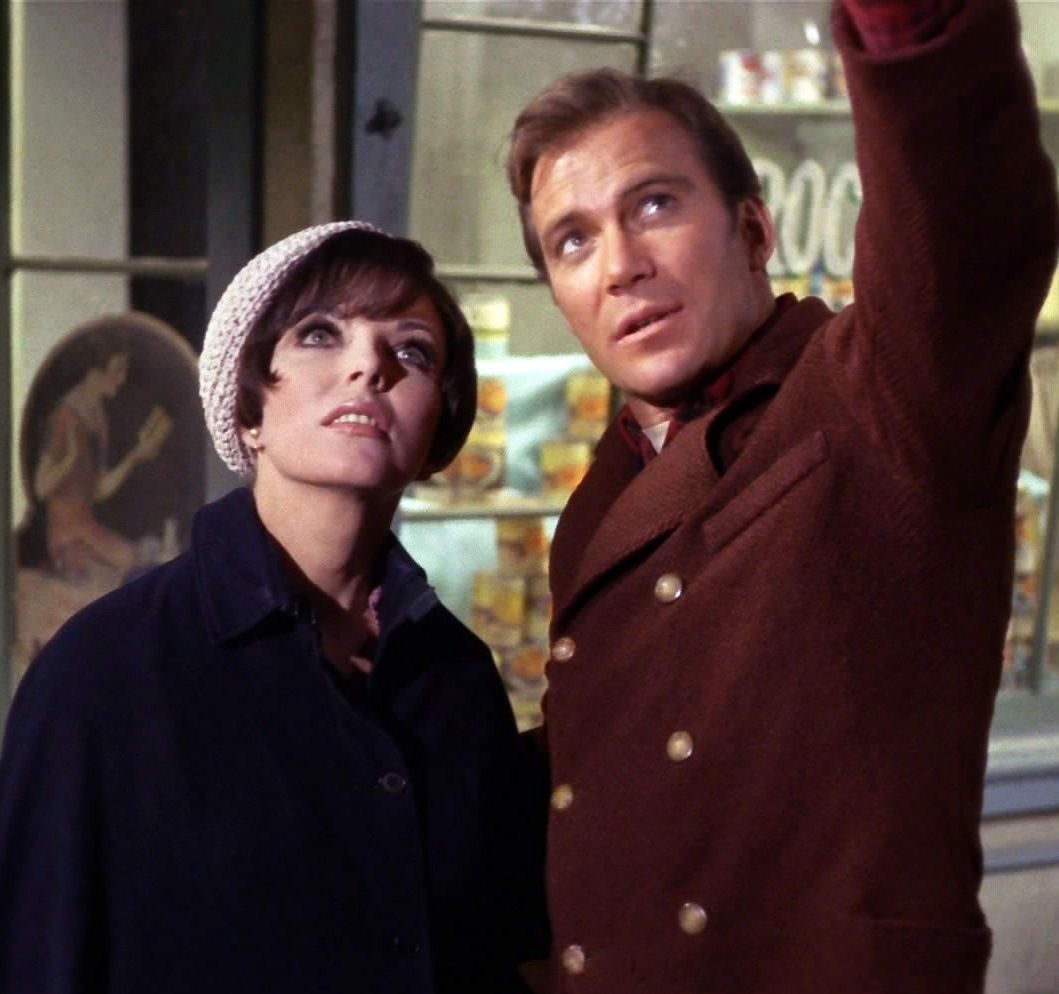 The granddaddy of depressing SF TV, in an age that had only known the likes of Tom Corbett, Voyage to the Bottom of the Sea and Lost in Space, though The Twilight Zone had delivered us some dark stuff, I find the likes of “The Monsters are Due on Maple Street” and “Time Enough at Last” to be more delightfully ironic character pieces with twisted, almost Poe-like endings. They didn’t depress me or rob me of hope. Nuclear holocausts are too big to absorb, and the small tragedy of the last man on Earth losing his glasses just as he finally has time to read books is almost humorous in the face of the loss of the human race. And a man being shot because paranoia has whipped his neighbors into Xenophobic fury? Suckage, yes, but suckage that lets the viewer shake his finger at the screen and say “I’m glad I’m more enlightened than those idiots!”
The granddaddy of depressing SF TV, in an age that had only known the likes of Tom Corbett, Voyage to the Bottom of the Sea and Lost in Space, though The Twilight Zone had delivered us some dark stuff, I find the likes of “The Monsters are Due on Maple Street” and “Time Enough at Last” to be more delightfully ironic character pieces with twisted, almost Poe-like endings. They didn’t depress me or rob me of hope. Nuclear holocausts are too big to absorb, and the small tragedy of the last man on Earth losing his glasses just as he finally has time to read books is almost humorous in the face of the loss of the human race. And a man being shot because paranoia has whipped his neighbors into Xenophobic fury? Suckage, yes, but suckage that lets the viewer shake his finger at the screen and say “I’m glad I’m more enlightened than those idiots!”
“City,” however, hands us a gem of a problem, a gem so awful that it keeps getting used over and over again by writers who either can’t think of another story to tell, or who just are so defective and demented that they actually enjoy the idea. And the gem is this: suppose you were the man tasked with saving the universe, you had to kill one person to do it, and it just happened to be the woman you loved?
Ain’t no delicious irony or finger-shaking sense of schadenfreude in that one, kids. Just pass the little brown bottle with the pills in it. This script was penned by the much-revered Harlan Ellison, who if I’m not mistaken, until Babylon 5, did not have a single positive experience writing for a TV show. And he wrote for a bunch of them! He was unhappy with changes made to his script by D.C. Fontana, the story editor, and he’s written a whole book about the subject. Not surprising such a book would be published, though, as it’s possibly the most famous and popular episode of the series and a Hugo winner.
Planet of the Apes – whole series (1968 – 1973)
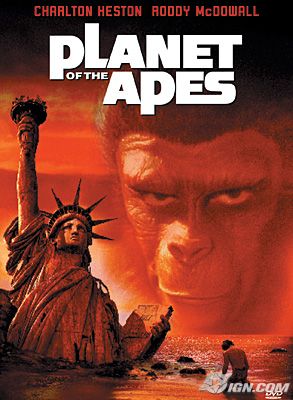 Had the sequels not been made, I might have placed the 1968 SF Masterpiece in the “deliciously ironic” category. It was, after all, scripted by The Twilight Zone’s Rod Serling, and it’s an intelligent and satisfying film. Yeah, it’s a pretty grim prospect, human civilization decaying until we’re all savages, treated like animals by intelligent, civilized apes. There’s satisfaction to be found, though, in seeing that our successor species is just as short-sighted, bigoted, scape-goating and political as we are. And it leaves its hero with the hope of a new life, perhaps as the father or a new human race.
Had the sequels not been made, I might have placed the 1968 SF Masterpiece in the “deliciously ironic” category. It was, after all, scripted by The Twilight Zone’s Rod Serling, and it’s an intelligent and satisfying film. Yeah, it’s a pretty grim prospect, human civilization decaying until we’re all savages, treated like animals by intelligent, civilized apes. There’s satisfaction to be found, though, in seeing that our successor species is just as short-sighted, bigoted, scape-goating and political as we are. And it leaves its hero with the hope of a new life, perhaps as the father or a new human race.
And then they decided to make another one. Charlton Heston saw right away what a bad idea this was. He let them bribe him into appearing, on the condition that his character be killed so that he’d be off the hook. He got his wish, and then some. Beneath the Planet of the Apes killed not only George Taylor, but the whole freakin’ planet Earth. Naturally, it was human technology that did it. A Rod Serling film points out human foibles and makes us think about them. A knock-off sequel just passes judgment and tells us we’re inherently evil. Dead world and everything, APJAC productions still managed to milk three more sequels out of this franchise. Only the last contained any glimmer of hope for the future, though the third, with Apes in modern Los Angeles, was easily the most fun, for all its ending is brutal.
“The Cold Equations” – selected for SF Hall of Fame in 1970
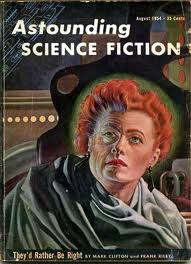 Did I give Harlan Ellison credit for the scenario in which killing an innocent is the only option? That wouldn’t be fair, for it was Tom Godwin who wrote “The Cold Equations,” published in Astounding in 1954. (And even then, there are those who say the story is derivative.) Yes, it’s a bit outside my time frame of analysis, but I’d point out that it was voted into the Hall of Fame in 1970, which is probably a good indicator of the mind set of the times.
Did I give Harlan Ellison credit for the scenario in which killing an innocent is the only option? That wouldn’t be fair, for it was Tom Godwin who wrote “The Cold Equations,” published in Astounding in 1954. (And even then, there are those who say the story is derivative.) Yes, it’s a bit outside my time frame of analysis, but I’d point out that it was voted into the Hall of Fame in 1970, which is probably a good indicator of the mind set of the times.
In this one, a teenaged girl stows away on a space ship, thinking that the signs warning against unauthorized entry are, like most such signs, just rules dreamed up by bureaucrats, with no real bite behind their bark. Turns out she’s aboard a ship with only enough fuel to carry its declared payload — medical supplies for a colony world. The pilot has two choices: let her live, doom the mission, and allow a lot of colonists to die, or…
Out into space the innocent-but-rule-breaking girl goes. Who enjoys thinking about scenarios like this, much less writing them down? A lot of people, apparently, for it’s one of the most anthologized and adapted SF stories ever written… even if it is pretty much a textual snuff film without sex.
U.F.O. – “A Question of Priorities”
 I love Gerry & Sylvia Anderson’s work, but, well, they’re English, aren’t they? (So am I, genetically, almost 100%. A little Irish, a little Cherokee, but mostly English. So no outcries, please!) It’s a county where it’s dreary and foggy a lot, so perhaps cheerfulness doesn’t come easy. Perhaps that’s why British SF can be especially depressing. Unlike depressing American offers, British SF stories where the hero must make the choice of letting an innocent die tend to incoporate the events into something more pedestrian, some less prone to stop all traffic for a moment. “Right, chaps, we’ve got to defeat these aliens, so Johnson has to buy it. Sorry, old man. (BLAM!) Right, so Johnson’s dead, who’s for tea before we launch?”
I love Gerry & Sylvia Anderson’s work, but, well, they’re English, aren’t they? (So am I, genetically, almost 100%. A little Irish, a little Cherokee, but mostly English. So no outcries, please!) It’s a county where it’s dreary and foggy a lot, so perhaps cheerfulness doesn’t come easy. Perhaps that’s why British SF can be especially depressing. Unlike depressing American offers, British SF stories where the hero must make the choice of letting an innocent die tend to incoporate the events into something more pedestrian, some less prone to stop all traffic for a moment. “Right, chaps, we’ve got to defeat these aliens, so Johnson has to buy it. Sorry, old man. (BLAM!) Right, so Johnson’s dead, who’s for tea before we launch?”
Okay, I exaggerate. Still, I think there’s a special “stiff upper lip” quality to the “somebody’s gotta die” scenario when it’s done across the pond. Ironically, it’s American-born star Ed Bishop who headlined the series UFO, and it’s his character, American Air Force Colonel Ed Straker, who must make the hard choices here. Straker’s young son has been hit by a car. He needs antibiotics or he’s gonna die. Straker allows the plane which is rushing the drugs to the hospital to be diverted to investigate a UFO sighting. This kinda dulled the sheen of those nifty, purple wigs and silver bikinis the women on Moonbase wore…
Omega Man – 1971
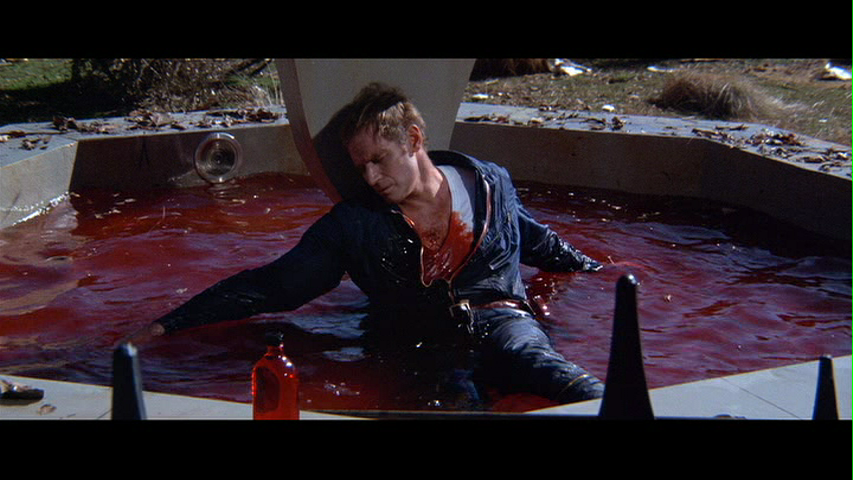 I don’t believe I’ve ever seen all of this movie! Remember, if you can, the days when there were no DVRs, VCRs or other three-letter givers of pain and delight to let us catch the shows we missed. Most of the time, you didn’t know what the SciFi Saturday movie on the local independent channel was until you tuned in. And you usually didn’t tune in until the movie was about a half-hour gone. (Don’t ask about independent channels. They’re gone. Now we have YouTube.)
I don’t believe I’ve ever seen all of this movie! Remember, if you can, the days when there were no DVRs, VCRs or other three-letter givers of pain and delight to let us catch the shows we missed. Most of the time, you didn’t know what the SciFi Saturday movie on the local independent channel was until you tuned in. And you usually didn’t tune in until the movie was about a half-hour gone. (Don’t ask about independent channels. They’re gone. Now we have YouTube.)
Anyway, the amazing Mr. Heston was back, the death clause firmly stapled to his contract. Omega Man, based on Richard Matheson’s I Am Legend, is pretty much a zombie apocalypse pic. A plague has wiped out humanity, and those who survived the infection have become albino mutants. They want to kill all remaining, non-infected humans… which is pretty much Chuck Heston. His requested death is almost Christ-like, and it does leave hope for the future. Trouble is, after sitting through an hour or so of this movie, one wonders if a future is even something one wants.
Six Million Dollar Man – “Population: Zero” (1973)
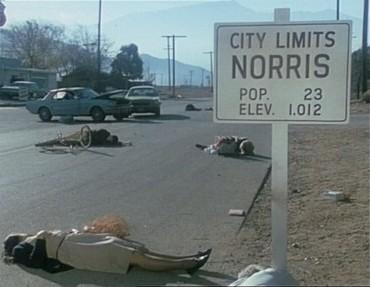 Harve Bennett is someone for whom I have a very soft spot in my heart. Not only did he bring us the Six-Million Dollar Man and The Bionic Woman back in the day, he saved the Star Trek franchise from oblivion with The Wrath of Khan and its sequels. He’s also personally been kind, gracious and encouraging to my family and my friends over the years when he’s been our guest at conventions. A man with a five-decade career in Hollywood who can be troubled to ask a 13-year-old playwright (my eldest son) for a DVD copy of his first production is someone whose generosity knows no bounds.
Harve Bennett is someone for whom I have a very soft spot in my heart. Not only did he bring us the Six-Million Dollar Man and The Bionic Woman back in the day, he saved the Star Trek franchise from oblivion with The Wrath of Khan and its sequels. He’s also personally been kind, gracious and encouraging to my family and my friends over the years when he’s been our guest at conventions. A man with a five-decade career in Hollywood who can be troubled to ask a 13-year-old playwright (my eldest son) for a DVD copy of his first production is someone whose generosity knows no bounds.
So it’s not surprising (to me, anyway) that the Six-Million Dollar Man episode which comes closest to capturing some of that dark, 70s feel isn’t really an example of depressing SF at all. Oh, yes, “Population Zero” contains imagery which has haunted me since I first saw it at the age of eight: an empty swing with a doll seated upon it, still swinging, as dust blows by; a pan to laundry on a clothes line, unattended, and then the reveal… one body… two… a dozen or more… bodies, lying in the streets of a town whose welcome sign boasts 23 inhabitants… But all is not as it seems, and Bionic Man Steve Austin’s Andromeda-Strain-inspired venture into the town wearing a space suit soon reveals the inhabitants to be alive, but immobilized by sound waves from a piece of high tech ordnance. Steve battles the mad scientist who built the device and saves the day. Not depressing at all, but the opening images are enough to say to a small child, “this is serious!” without giving him nightmares.
It’s too bad that an attempt to bring the bionics back a few years ago resulted in a Bionic Woman series which was bloody, dark and hyper-violent. As Lindsay Wagner observed, they just didn’t get what her show was all about: people with phenomenal abilities and extraordinary courage and compassion, trying to make the world a better place. Some modern creators think that won’t fly with a modern, “sophisticated” audience. Perhaps they’re right. Now there’s a thought which does keep me awake nights!
Space: 1999 – “The Last Enemy” – (1976)
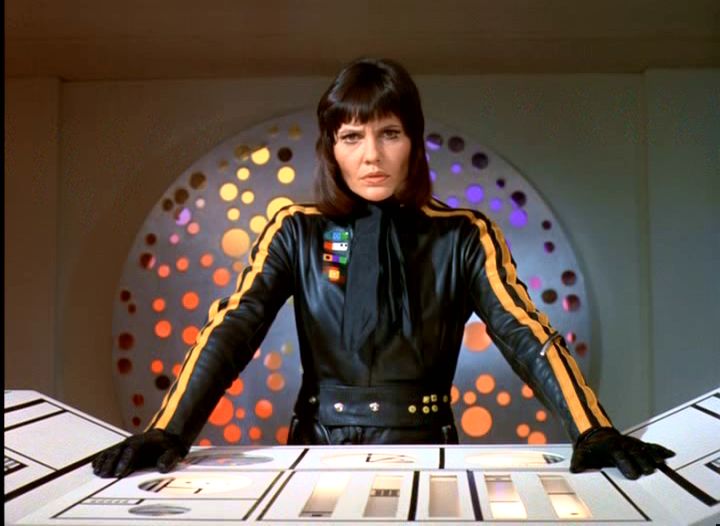 More British SF from the Andersons, who unfortunately divorced following the first series of this ground-breaking program. This contains elements of the “somebody’s gotta die” concept. It’s far subtler, however, than, say “City on the Edge” or “The Cold Equations.” The wandering Moonbase Alpha drifts into the line of fire between two warring planets. One side lands on the moon with enough armament to destroy the other side. Martin Landau’s Commander John Koenig is told he has two choices: destroy the visitors, or be destroyed by their opponents. He chooses the lesser of two evils, blowing the fiercely erotic alien commander Dione to hell. Dione, of course, is not an innocent. She’s a devious predator who doesn’t care what happens to the innocents who have drifted onto her battlefield. Still… nobody’s happy here.
More British SF from the Andersons, who unfortunately divorced following the first series of this ground-breaking program. This contains elements of the “somebody’s gotta die” concept. It’s far subtler, however, than, say “City on the Edge” or “The Cold Equations.” The wandering Moonbase Alpha drifts into the line of fire between two warring planets. One side lands on the moon with enough armament to destroy the other side. Martin Landau’s Commander John Koenig is told he has two choices: destroy the visitors, or be destroyed by their opponents. He chooses the lesser of two evils, blowing the fiercely erotic alien commander Dione to hell. Dione, of course, is not an innocent. She’s a devious predator who doesn’t care what happens to the innocents who have drifted onto her battlefield. Still… nobody’s happy here.
Logan’s Run – “Man Out of Time” – (1977)
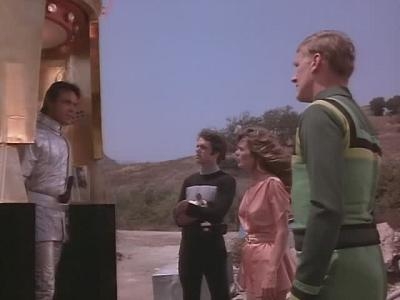 I loved this show. There was a lot to love, honestly. It was story-edited by D.C. Fontana, who had shepherded Star Trek’s scripts and could reasonably be called the co-creator of Spock, as well as full creator of his parents, Sarek and Amanda. Some amazing writers contributed scripts, including Logan creator William F. Nolan, Harlan Ellison, David Gerrold, John Meredith Lucas, Denny O’Neil and Fontana herself. Headlining the series was rising star Gregory Harrison, supported by the beautiful and somewhat edgy Heather Menzies and Donald Moffat. It extended the story from the film Logan’s Run, in which a futuristic police officer (a “Sandman”) whose primary job is to ensure that all citizens obey the law and voluntarily die at age 30, flees his oppressive utopia in search of a better life. Being produced for television, it adopted the formula of the previously successful series The Fugitive, with Logan and Jessica travelling from place to place, helping the afflicted. Still, despite the formula, it was a bright, adventurous show with a sense of humor. It cancelation, following many local pre-emptions, caused me to make my first ever call of protest to a local TV station.
I loved this show. There was a lot to love, honestly. It was story-edited by D.C. Fontana, who had shepherded Star Trek’s scripts and could reasonably be called the co-creator of Spock, as well as full creator of his parents, Sarek and Amanda. Some amazing writers contributed scripts, including Logan creator William F. Nolan, Harlan Ellison, David Gerrold, John Meredith Lucas, Denny O’Neil and Fontana herself. Headlining the series was rising star Gregory Harrison, supported by the beautiful and somewhat edgy Heather Menzies and Donald Moffat. It extended the story from the film Logan’s Run, in which a futuristic police officer (a “Sandman”) whose primary job is to ensure that all citizens obey the law and voluntarily die at age 30, flees his oppressive utopia in search of a better life. Being produced for television, it adopted the formula of the previously successful series The Fugitive, with Logan and Jessica travelling from place to place, helping the afflicted. Still, despite the formula, it was a bright, adventurous show with a sense of humor. It cancelation, following many local pre-emptions, caused me to make my first ever call of protest to a local TV station.
David Gerrold (who used the pen name “Noah Ward” due to third-party rewrites) wrote “Man Out of Time,” a story of a visitor from the past who comes to Logan and Jessica’s 24th Century Earth hoping to find out what event triggered the nuclear holocaust he was pretty sure was about to happen in his own time. He’d build an impressive data back to store all news and history, and this allowed him to come forward a few centuries and grab the data, which he could then analyze to see what went wrong. The theory being, of course, that the knowledge would allow him to prevent Armageddon. Well — surprise! — he caused it, just by inventing time travel and letting the world know it existed. Happy times.
Not that I’m knocking David, who’s one of my favorite SF authors. I’m not really knocking any of the creators listed herein. Indeed, I have a great fondness for almost every work I’ve covered. Just sayin’… y’know… lighten up!
And there’s a sampling, bringing us to the Summer of 1977, where we get to say… … Thank god for Star Wars! (Not something I say very often anymore, but I do love the first fourth first film in this series, and it did rescue us once and for all from a plethora of SF downers.)

Pingback: Review – Iron Cage by Andre Norton - Steven H. WilsonSteven H. Wilson